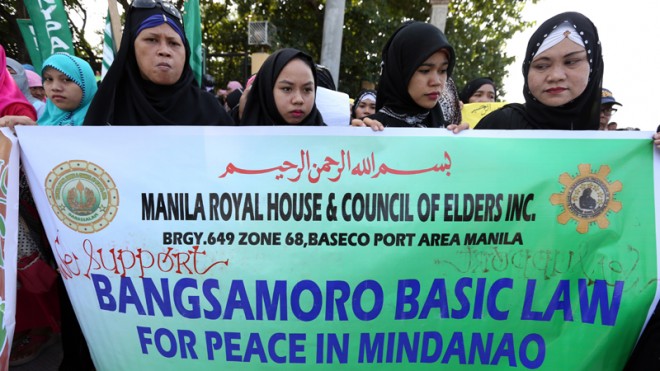
Muslims gather outside the Senate to push for the swift passage of the Bangsamoro Basic Law. FILE PHOTO
Nearly half, or 48 percent, of Filipinos disapprove of the proposed Bangsamoro Basic Law (BBL), according to the results of a Social Weather Stations (SWS) survey.
The nationwide survey, conducted from March 20 to 23, also found that most Filipinos were not hopeful that the proposed Bangsamoro government would bring peace in its core territories or that the government would benefit from the peace talks with the secessionist Moro Islamic Liberation Front (MILF).
However, an earlier SWS survey conducted from Feb. 22 to March 1 in the core territory of the proposed Bangsamoro entity found the respondents to be more hopeful that a Bangsamoro government would bring peace and development after May 2016, and that the Filipino people would benefit from the peace talks with the MILF.
Included in the survey were Sulu, Basilan, Isabela City, Tawi-Tawi, Lanao del Sur, Maguindanao, Cotabato City, and the areas near the Autonomous Region in Muslim Mindanao (ARMM) in Lanao del Norte and Cotabato.
The February special survey in the core territory also found that most people in the area were hopeful that Congress could still pass the BBL despite the negative fallout from the killing of 44 troopers from the elite Special Action Force in Mamasapano, Maguindanao, in January, in the hands of MILF and Bangsamoro Islamic Freedom Fighters (BIFF) rebels.
“Attitudes toward the proposed Basic Law were positive throughout the core territory,” SWS said in a statement released on Friday.
Opinion on BBL
Nationwide, 48 percent of the respondents said they disapproved of the proposed BBL, while 23 percent approved and 28 percent expressed indecision, resulting in a record-low net score (approval minus disapproval) of -24. The latest figure was 41 points lower than the net +16 (44 percent approve, 27 percent disapprove, correctly rounded) posted in June 2014.
But net approval of the proposed BBL in the core areas ranged from +91 in Cotabato near ARMM (93 percent approve, 2 percent disapprove) to +18 in Sulu (31 percent approve, 14 percent disapprove) and Isabela City (38 percent approve, 20 percent disapprove).
“Not hopeful” was the sentiment of 62 percent of respondents nationwide when asked in the nationwide March survey about whether the proposed Bangsamoro government would bring peace and development in its core territories, while 37 percent said they were hopeful.
Among those surveyed in the core territories, the proportion of those who said they were “very hopeful/somewhat hopeful” that the new Bangsamoro government would bring peace and development after May 2016 ranged from 49 percent in Sulu to 96 percent in Cotabato near ARMM.
The proportion of those who were “somewhat not hopeful/not hopeful at all” ranged from 4 percent in Cotabato near ARMM to 52 percent in Sulu.
Benefit of peace talks
According to the nationwide survey, 56 percent of the respondents said the peace talks with the MILF would yield “a little benefit/no benefit at all” to Filipinos, while 42 percent said otherwise.
On the other hand, the February survey in the core territories showed the majorities saying they saw “much benefit/moderate benefit” in the ongoing peace talks with the MILF, ranging from 59 percent in Sulu to 97 percent in Cotabato near ARMM and Maguindanao.
Hope majority sentiment
Hope was the majority sentiment in the core territories, except in Sulu, where 56 percent were “somewhat not hopeful/not hopeful at all” that Congress could still pass the BBL despite the Mamasapano incident. Forty-four percent in Sulu were “very hopeful/somewhat hopeful” that Congress can still pass the BBL.
The proportion of those who were “very hopeful/somewhat hopeful” that Congress can still pass the BBL despite the Mamasapano incident ranged from 54 percent in Isabela City to 94 percent in Cotabato near ARMM.
Little knowledge of BBL
Nationwide, knowledge about the BBL was insufficient as 83 percent said they had “little or no knowledge” while 17 percent said they had “extensive or partially sufficient knowledge” about it.
In the core areas surveyed, the proportion of those who had “extensive/partial but sufficient” knowledge about the BBL ranged from 26 percent in Sulu to 54 percent in Cotabato near ARMM. Those who said their knowledge was “only a little/almost none” ranged from 48 percent in Lanao del Sur to 71 percent in Maguindanao.
The national survey, conducted from March 20 to 23, used face-to-face interviews with 1,200 respondents. It had a margin of error of plus-or-minus 3 percentage points.
The special survey in the core territory of the proposed Bangsamoro, conducted from Feb. 22 to March 1, used face-to-face interviews with 1,500 respondents. It had a margin of error of plus-or-minus 2.5 percentage points. Of the 1,500 respondents from Bangsamoro territories, 800 were from the Sulu archipelago, while 700 were from Central Mindanao. Inquirer Research
RELATED STORIES
What is the new name of the proposed Bangsamoro Basic Law?
Speaker eyes Plan B if Congress junks Bangsamoro Basic Law
BBL is ‘best chance for peace,’ says MNLF
Marcos: Exclusion of stakeholders brought to fore in BBL hearings